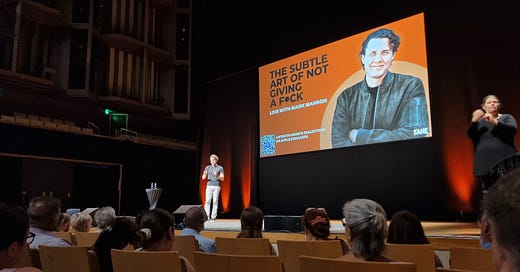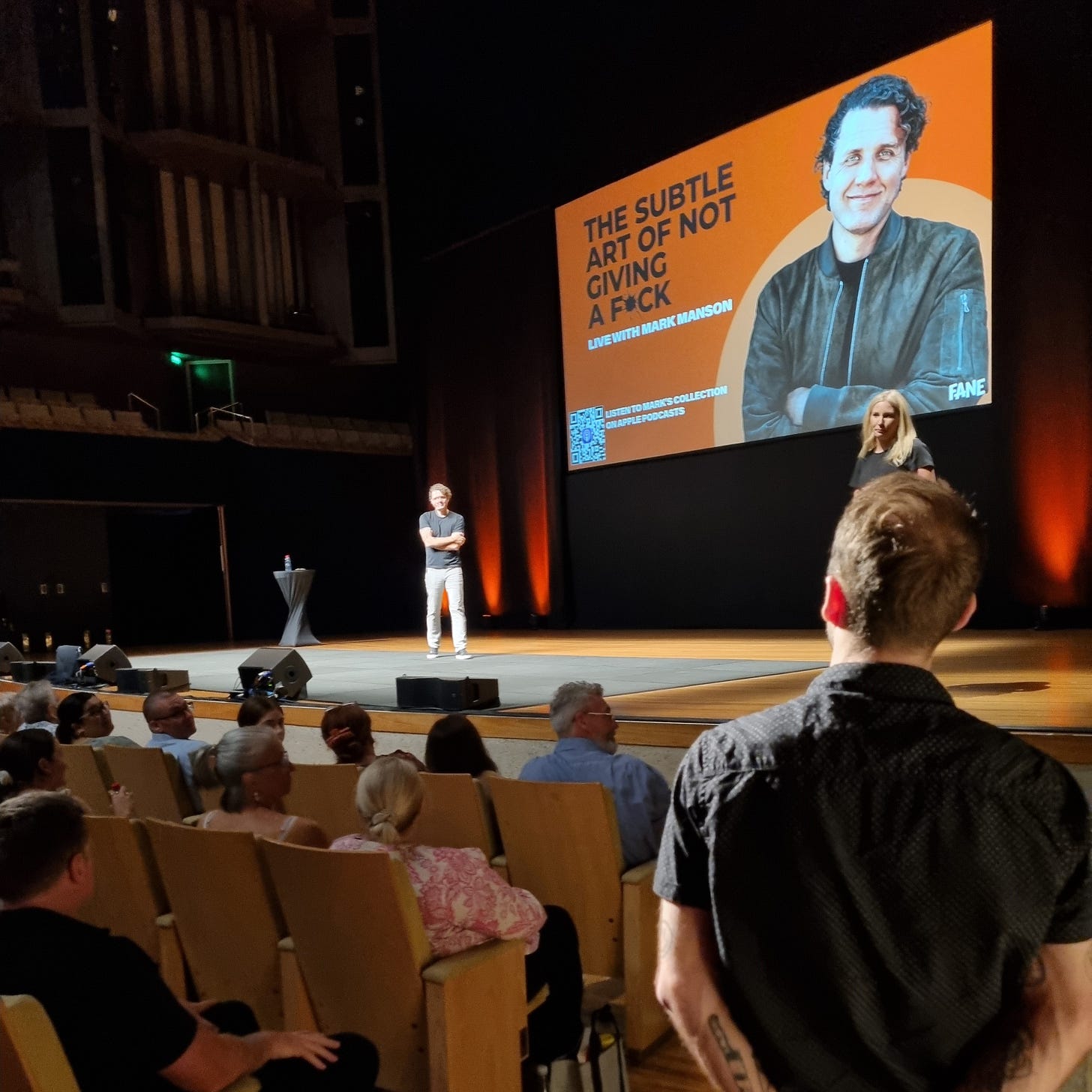Things I Learned from a Live Talk with Mark Manson
The ironies of love and pain and knowing what to care about
I usually post on Mondays and the occasional Thursday or Sunday, but my work roster is changing as of tomorrow, so I’ll try to post every Friday or Saturday instead. It’s only temporary – with earlier starts and a slight pay rise – then I’ll be looking to go part-time in the new year as planned. Wish me luck!
Last week I attended a live talk from none other than my biggest philosophical influence, self-development author and podcaster Mark Manson, at QPAC in Brisbane. You might know him as the guy who wrote the bestselling books The Subtle Art of Not Giving a F*ck and Everything is F*cked. I’ve mentioned him on here numerous times before and shared links to his podcast and YouTube channel for you to check out. If you haven’t already, do yourself a favour and get onto it now for your bi-weekly dose of no-bullshit wisdom (I also recommend subscribing to his weekly newsletter for general life advice and journalling prompts).
I first read Subtle Art when I was in a toxic relationship years ago, then I read Everything is F*cked after it ended. I found Mark’s unorthodox writing style and brutal honesty refreshing, particularly during times of personal upheaval. He swears a lot and makes some confronting analogies, with a nonchalant approach to offering harsh truths and destroying your misconceptions. Although, you come to learn that it’s also necessary to begin again, cleaning the slate to start from scratch. He gives you the tools to navigate a merciless world with a headful of noise, which is exactly what I needed when I discovered his work.
I was seated four rows from the front, right on the end, and listened attentively as Mark delivered a 90-minute presentation on bettering oneself to live a good life. I didn’t make notes throughout because I wanted to be completely present and I figured that the best bits would stick with me anyway. So, since some good friends of mine couldn’t make it after buying tickets, I thought that I would share my key learnings from the talk on here for everybody’s benefit. Enjoy!
Experiment a little before you make a change
I’m sure that, like me, you’ve wanted to make a significant change in your life at one point or another and decided to go cold turkey and dive straight into it. And I’m guessing that, like me, it probably didn’t work out as planned. Mark suggests that testing the waters with little experiments first is the best way to set realistic, achievable goals and raise the bar as you go. He gave a personal example of quitting drinking, which began as trying to go a week sober. When he noticed the positive effects of cutting out alcohol, he decided to extend it to a month. Years later, he hasn’t had a drop since. Small adjustments lead to eventual growth.
Everything comes with a trade-off
He really hammered this one, and for good reason. Relationships are all about compromise. When he used to offer dating advice for a living, he said that most people’s standards were far too high and you must at least meet what you expect of somebody else. Instead of looking for your ideal match in regular human beings and going home disappointed every time, choose three things that are non-negotiables for you and be willing to compromise on the rest. This can be applied to all areas of life, particularly in the workplace, and it’s something that I try to remember whenever it seems that everything is working against you. Your day will come!
We overvalue short-term feelings and undervalue long-term commitments
This is a big one. In this day and age, distractions are everywhere we turn. As a result, we prioritise momentary happiness over lasting satisfaction. Seeking attention on social media, eating junk food, and one night stands are fleeting impulses that offer a dopamine hit. Having a meaningful conversation, exercising regularly, and investing in a healthy relationship are rewarding experiences that provide ongoing fulfilment. It’s easy to get caught up in the moment and give in to your cravings, but holding out for the long haul and doing the hard yards will feel so much better. Trust in the process!
Narcissism doesn’t always look the same, but it always ends the same
Apparently, there are two types of narcissism: grandiose and vulnerable. Grandiose narcissism is a form of obnoxious ignorance where a person behaves aggressively to get what they want. Vulnerable narcissism is the inverse, where a person plays the victim for sympathy to get what they want. They are at opposite ends of the spectrum, but both feel that they deserve special treatment. It’s a matter of entitlement, which is all too prevalent in modern society if you ask me (I work in retail, after all). The thing is, it never actually gets you anywhere when you’re on your own – and if you’re narcissistic, you will end up on your own.
Pain is inevitable, but to suffer is a choice
To explain this invaluable lesson, Mark shared the Buddhist parable of The Second Arrow. When one is hit with a single arrow, the anguish and torment one creates from interpreting the meaning of it acts as a second, which can be fatal. Of course, a wound will heal with time. But when we consider the arbitrary incident a personal attack, we suffer more than is necessary. “Why did this have to happen to me? I don’t deserve this!” Maybe you don’t, maybe you do. Either way, it’s happened and you have to deal with it. We construct false narratives from our suffering because it’s harder to accept that there is no reason.
After a short break, Mark returned to the stage for a live Q&A session. As I was four rows from the front, you know damn well that I got in line to ask the man for a piece of his mind. My question was simple: What did your daily ritual look like when you were starting out as a writer? In hindsight, I probably should have followed it up with, ‘…And what does it look like now?’ Maybe next time. His answer was equally simple. He would wake up at around 11am, drink Red Bull for breakfast, write at his computer until about 5pm, go out drinking, come home around midnight, then continue to write until he passed out at the keyboard. At least he was honest.
Later in the Q&A, he mentioned that when people ask him how they should write, he tells them to go write 100 articles then come back and ask him again. Funnily enough, they never do. So, I’m taking that as a tongue-in-cheek extension of his answer to my own question and, as I said earlier, doing the hard yards. It was unexpectedly heated and emotional at times, with one woman accusing him of being a privileged upper-class white male then screaming into the mic at a room of defensive fans. Another woman in her 70s broke down after admitting that she is bitter about her daughter’s success. Yet Mark still offered carefully considered answers with humility and empathy, never missing a beat.
I’ll leave you with a final nugget of gold from the man that I made a mental note of when somebody asked what is wisdom, and does it require suffering.
“Knowledge is knowing lots of stuff; Wisdom is knowing what is worth knowing, and suffering offers clarity to care about the right stuff.”






